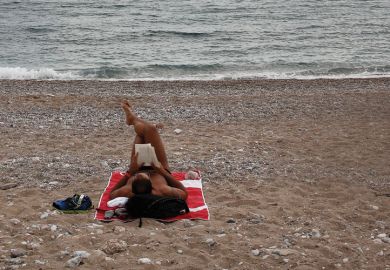Watching Universities UK carefully marshal its evidence and arguments before becoming a leading voice in the EU referendum “yes” campaign is a bit like watching someone have a manicure before getting into a bare-knuckle fist fight. It looks nice, but I’m not sure how much good it will do them.
The likely tone of the EU referendum debate, given that immigration and national identity will be major topics, may leave UUK’s Universities for Europe campaign struggling to be heard.
For an insight into the “no” campaign, Dominic Cummings’ blog is worth a read. Cummings, a former adviser to Michael Gove who describes himself as “helping establish some foundations” for the “no” campaign rather than running it, calls for “huge discipline, simplification, and focus”.
I’ve looked at what a Brexit could mean for the UK’s universities in a feature out today, for which I interviewed figures ranging from a Ukip MEP to José Manuel Barroso, president of the European Commission until 2014.
One of the main messages I took away from the interview with Barroso, now a visiting professor at Princeton University, was his clear warning that a Brexit would have consequences for UK universities. “I believe that if the UK is no longer a member of the EU, there will certainly be a loss of research funding,” he said, adding there would also be “damage to faculty and student mobility”.
Barroso isn’t entertaining any notion that the UK could become an “associated country”, like Norway or Israel, and still join in with the EU’s research programmes (but then you wouldn’t expect him to).
The EU’s treatment of Switzerland after a 2014 referendum backed restrictions on freedom of movement is seen by some observers as a lesson on the problems of “associated country” status and as a direct warning to the UK. Following the vote, the EU suspended talks with Switzerland over its participation as an associated country in Horizon 2020, the EU’s research programme, and Erasmus+, its student mobility scheme.
“Sometimes we only give value to things when we lose them,” Barroso said of that episode. It’s hard not to see a message to the UK there.
For every argument that universities will make on the benefits of EU membership, there is a counterargument that will be made by a vociferous “no” campaign – and the feature goes through these on issues from research funding to staff and student mobility. Emran Mian also went through many of the counterarguments in a good blog about universities and the EU referendum campaign. I filed my piece several weeks ago before Emran’s blog came out (we’re very painstaking in editing and designing our features at Times Higher Education), but I was glad to see we were looking at similar issues.
The big argument that UUK will make is that EU-backed research has real benefits for people in this country, benefits that we just couldn’t replicate with replacement national research funding. Martin Widschwendter, professor of women’s cancer at University College London, made that argument when I talked to him about his EU-funded project to develop a test predicting women’s risks of cancers. But it’s an argument that the “no” campaign will challenge – and there are certainly criticisms of EU research funding that could be levelled.
UUK’s first big event in the Universities for Europe campaign is on 27 July, in the shape of a “discussion” about “why being in the UK matters for our universities and for the UK”. Chuka Umunna, Labour’s pro-Europe shadow business secretary, and Damian Green, the pro-Europe Conservative MP, will be among the speakers.
Should be interesting, especially if Cummings and the “no” campaign can get someone along.
Register to continue
Why register?
- Registration is free and only takes a moment
- Once registered, you can read 3 articles a month
- Sign up for our newsletter
Subscribe
Or subscribe for unlimited access to:
- Unlimited access to news, views, insights & reviews
- Digital editions
- Digital access to THE’s university and college rankings analysis
Already registered or a current subscriber?








